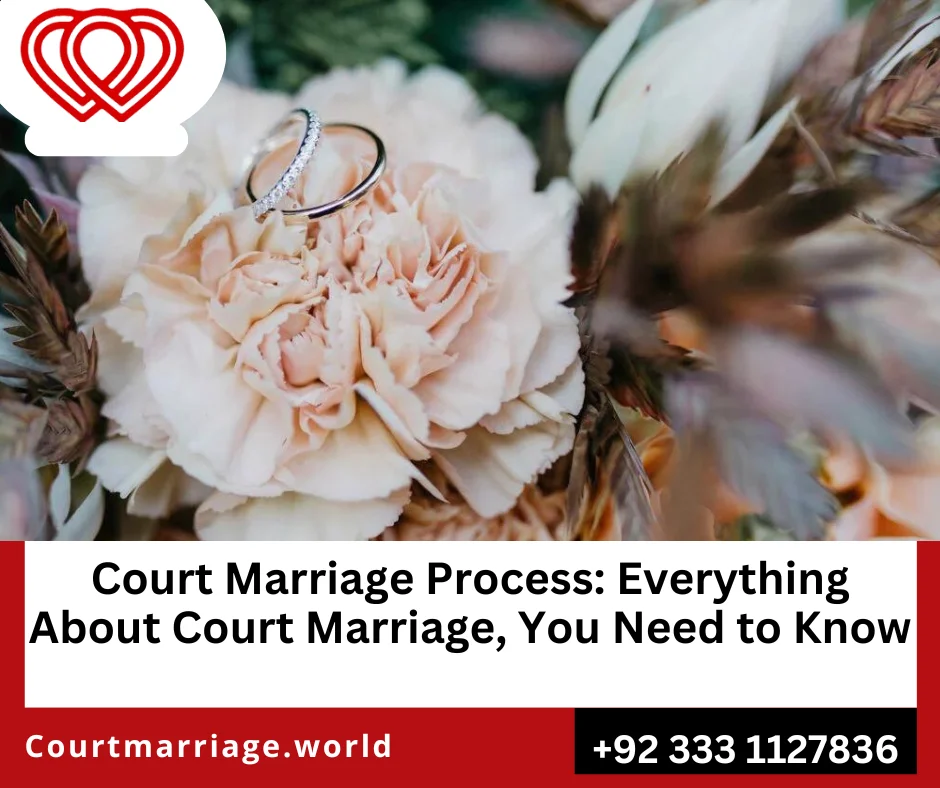- 0333 1127836
- info@courtmarriage.world
- Karachi - Lahore - Islamabad - Rawalpindi - Multan
Court Marriage in Pakistan: A Step-by-Step Guide for Couples
In Pakistan, where traditional weddings are an integral part of the cultural fabric, court marriage has become an increasingly popular choice for couples who prefer simplicity, privacy, and legal recognition. For those looking to avoid elaborate ceremonies and high costs, a court marriage offers a straightforward, legal path to marital union. This guide provides a comprehensive look at the court marriage process in Pakistan, explaining each step clearly to help couples navigate the procedure with ease.
What is Court Marriage in Pakistan?
A court marriage in Pakistan refers to a legal union between two individuals solemnized by a judge in a family court. This form of marriage is recognized by the government, and the couple receives an official marriage certificate. It is legally binding and ensures that the marriage is protected under Pakistani law, offering rights such as inheritance, property ownership, and legal recognition.
The simplicity of a court marriage makes it an attractive option for many couples in Pakistan, especially those who prefer a private ceremony or are seeking a more cost-effective alternative to traditional weddings.
Why Choose Court Marriage?
Before diving into the court marriage process, it’s important to understand why it might be the best option for you and your partner. Here are a few key reasons why couples opt for court marriage in Pakistan:
- Legal Protection: Once married through the court, your marriage is legally binding and recognized by the government.
- Privacy: Court marriage allows you to keep your marriage private, as it is not a public ceremony like traditional weddings.
- Affordability: The cost of a court marriage is significantly lower than that of organizing a traditional wedding.
- Speed: The entire process of court marriage can be completed in a matter of hours or a few days, depending on the court’s schedule.
- Convenience: It is an ideal choice for couples who prefer a simple, hassle-free way to get married.

Step-by-Step Guide to Court Marriage in Pakistan
Now that you understand the benefits, let’s take a closer look at the court marriage process in Pakistan. Here’s a step-by-step guide to help you through each stage:
Step 1: Verify Eligibility
Before applying for court marriage in Pakistan, ensure that you meet the eligibility requirements. The basic criteria for a court marriage are:
- Both individuals must be of legal age (the legal age for marriage is 18 years for men and 16 years for women in Pakistan).
- Both parties must agree to the marriage of their own free will.
- There should be no existing legal impediments to the marriage, such as already being married to someone else.
- Both individuals must be capable of giving consent.
Step 2: Gather Required Documents
For a successful court marriage, you will need to gather the necessary documents to submit to the court. These typically include:
- CNIC (Computerized National Identity Card) for both the bride and groom.
- Two passport-sized photographs of the bride and groom.
- Affidavit of free will, stating that both parties are entering the marriage voluntarily.
- Witnesses: Two witnesses are required, and they must be of legal age (18 years or older).
- Proof of age: If required, proof of age documents such as a birth certificate or a valid passport may be needed to ensure both parties meet the legal age for marriage.
It’s important to double-check the specific documentation requirements at your local family court, as they may vary slightly depending on the region.
Step 3: Select a Family Court
Once you have gathered the necessary documents, the next step is to select the family court where you want to apply for your court marriage. You can file the marriage application in any district court across Pakistan. However, it is often most convenient to choose a court located in the city or district where you reside.
You may also choose to seek legal assistance from a professional lawyer who specializes in court marriage. A lawyer can help ensure that your documents are in order and that the process runs smoothly.
Step 4: Submit the Application
Next, you will need to submit the court marriage application to the family court. This includes providing your details and the required documents. The court will review the application and schedule a hearing for the marriage to take place.
If you have a lawyer, they will apply on your behalf, and you will be notified of the date for your marriage ceremony.
Step 5: Appear Before the Judge
On the scheduled date, you, your partner, and your two witnesses will need to appear before the judge. The judge will verify your documents, check your consent, and ensure that there are no legal obstacles to the marriage.
The judge may ask questions to confirm that both parties are marrying willingly. Once everything is in order, the judge will solemnize the marriage.
During the ceremony, the couple and the witnesses will sign the marriage register, and the judge will issue a marriage certificate, which serves as legal proof of your union.
Step 6: Receive the Marriage Certificate
After the court marriage is solemnized, you will receive your court marriage certificate. This official document acts as proof of marriage and can be used for various legal and administrative purposes. It can be used to update your National Database and Registration Authority (NADRA) records, change your marital status on your identity card, and more.
The marriage certificate issued by the court is recognized throughout Pakistan. If you wish, you can also apply for a NADRA marriage certificate, which is a more formal document for official use.
Step 7: Optional NADRA Registration
Although your court marriage certificate is sufficient proof of your marriage, some couples choose to register their marriage with NADRA (National Database and Registration Authority) for a more official record.
The NADRA marriage certificate is widely accepted and used for legal, official, and administrative purposes, such as applying for a passport, visa, or updating other government records. To get your marriage registered with NADRA, you will need to submit your court marriage certificate along with the required documents.



Benefits of Court Marriage in Pakistan
There are numerous benefits to opting for a court marriage in Pakistan. Some of the key advantages include:
- Legally binding: The marriage is legally recognized by the government of Pakistan.
- Easy and fast process: The process is quick, often taking just a few hours or days to complete.
- No need for a traditional wedding: Court marriage eliminates the need for a large wedding ceremony and all associated costs.
- Privacy: Court marriages can be kept private, which is ideal for couples who prefer discretion.
- Affordability: The cost of court marriage is minimal compared to traditional weddings.
Why Choose Legal Assistance?
While the court marriage process is straightforward, some couples prefer to hire a lawyer to guide them through the procedure. A court marriage lawyer can help with:
- Ensuring that all documents are properly prepared and submitted.
- Providing advice on any legal issues related to marriage.
- Ensuring that the entire process is smooth, efficient, and legally sound.
A lawyer can also assist with the NADRA marriage certificate registration, ensuring that the marriage is fully documented and recognized.
A Simple and Legal Path to Marriage in Pakistan
For couples who seek a simple, legal, and stress-free union, court marriage in Pakistan is the ideal solution. With minimal paperwork, a quick process, and complete legal protection, court marriage offers an efficient way for couples to marry while enjoying the benefits of a legally recognized union. Whether you are in Islamabad, Karachi, Lahore, or any other city in Pakistan, court marriage provides a straightforward and affordable way to start your life together legally and securely.
